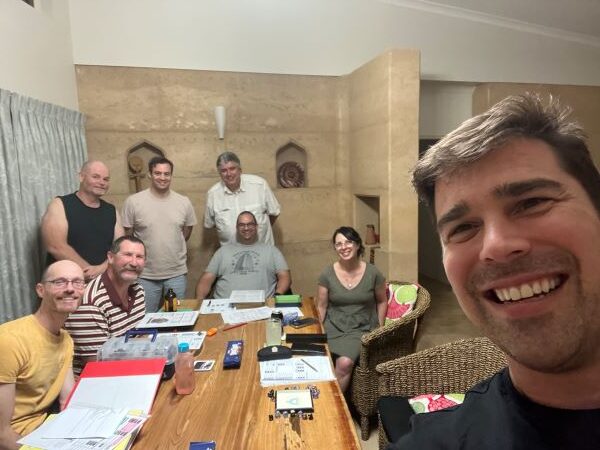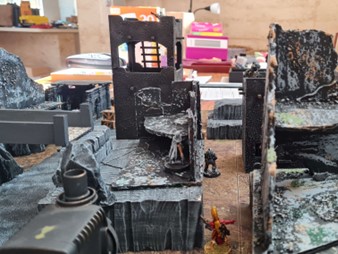Feedback is a vital component of personal and professional growth, and its value extends beyond the confines of the business world. A strong leader should be able to give and receive feedback graciously without getting emotional. In this post, we explore how the experience of receiving feedback while playing Dungeons and Dragons (D&D) can cultivate valuable skills that are applicable well beyond the game. We look at the art of giving and receiving feedback, active listening, self-reflection, adapting to constructive criticism, and fostering a culture of continuous improvement.
The Art of Giving and Receiving Feedback
D&D provides a rich environment for feedback exchange. Players often offer feedback on each other’s decisions, role-playing, or overall gameplay experience. After a session has finished the players will often talk about what happened. This includes the actions taken by players, their consequences and how things could have gone differently. Of course, this feedback is not mean spirited. Rather a way to collectively learn from mistakes and learn how to work together better.
By learning to provide constructive feedback and receiving it with openness, players develop skills in giving and receiving feedback effectively. This fosters an atmosphere of trust, respect, and growth that can be mirrored in the business world. However, giving and receiving feedback about the game is less likely to make you feel bad. After all, mistakes in game are often the best source of stories and shared reminiscing.
Feedback, whether constructive or positive should be given and received through the lens of growth (more on this later). Both help you grow and improve as an individual.
This article in Forbes Magazine give five tips for giving and receiving feedback:
- Lean into positivity
- Remember, feedback is all about perspective
- Set team members up for success
- Tackle necessary negative feedback
- Focus on enhancing rather than improving performance
If you are having to give feedback and are unsure how to frame it try using the SBI model. Situation – Behavior-Impact. It focuses on the behavior rather than the actual person preventing it being misread as a personal attack. As a simple explanation you would frame your conversation as follows:
- Situation- describe the situation. For example, our party was resting at the village only to wake up to discover a horde of orcs besieging us in the morning.
- Behavior- Upon seeing the orcs outside the gates you immediately yelled your battlecry and charged.
- Impact- The orcs countercharged, breached the walls, razed the village to the ground while our party barely escaped with our lives. In addition, we had to leave the cart of loot behind. As a result the mage, bard and thief are furious and will need some calming down.
- Behavior-What behaviors would help avoid the impact? This is where you get the impetuous fighter to think of alternatives.
- Impact- What might the new impacts have been?
This method removes the worry of having to think on your feet when giving feedback. I’ve used this model very effectively in my own leadership journey. Check out the link for a more detailed explanation.
Active Listening and Empathy
In D&D, active listening is vital for understanding the narrative, fellow players, and the DM. When players receive feedback, they have an opportunity to practice active listening, showing empathy, and understanding diverse perspectives.
These skills are invaluable in the business world, where leaders must listen attentively to their team members, clients, and stakeholders to make informed decisions and foster strong relationships. A leader who doesn’t practice active listening will miss vital information. Their team may come to consider them uncaring, effectively eroding any leadership capital you may have stored.

Self-Reflection and Growth Mindset
Playing D&D encourages self-reflection as players analyze their choices, actions, and impact on the game. Receiving feedback from the DM and other party members prompts players to reflect on their strengths, weaknesses, and areas for improvement. This cultivates a growth mindset—a belief that abilities can be developed through dedication and effort.
Similarly, in leadership individuals who embrace self-reflection and a growth mindset are more open to feedback, eager to learn, and resilient in the face of challenges. So much so that teaching self-reflection in leadership courses and MBAs is mandatory across the world.
I’ve tried to practice self-reflection throughout my leadership journey to date. I’ve found it lets me analyze my mistakes while preventing me from repeating them. On the other side self reflection has allowed me to understand where my strengths lie. Ultimately, this has led me to pursue a leadership career rather than sticking to my technical roots.
Adapting to Constructive Criticism
Of course, not all feedback is positive. If you have a table of players with a growth mindst D&D offers opportunities to receive constructive criticism that can help refine gameplay or role-playing skills. Learning to accept and embrace constructive criticism enables players to grow and enhance their performance. In my role as Dungeon Master I often ask my players how they found the session. Of course as part of this I receive constructive criticism. Rather than getting upset, I look at this as an opportunity to make the game more fun. Of course, this is much easier to do when you know that those giving the feedback are coming from a positive standpoint. Regardless, this is the most productive angle to take.
This skill translates directly to leadership, where professionals must be receptive to feedback to refine their skills, improve processes, and drive organizational success. If you are given constructive criticism in a professional setting thank the individual. Then reflect on it. Take time to consider why they might be presenting this to you, is it real and what can you do. Don’t just dismiss it out of hand. Treat it as a gift.
Applying Feedback for Personal and Professional Growth
The experience of receiving feedback in D&D not only improves your game, but can also serve as a springboard for personal and professional growth. By actively applying feedback, we can refine our decision-making, communication, problem-solving, and leadership skills within the game. AS we’ve learned, these skills directly transfer to the business world, enabling individuals to adapt, learn, and improve their performance. Win-Win.




